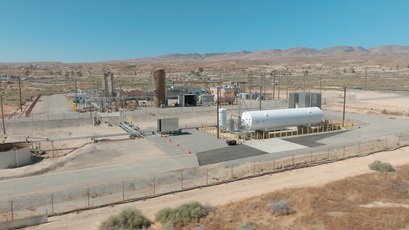emissions solutions
powering the world forward with california sunshine
powering chevron’s lost hills oil field with 1.4 billion kilowatt-hours of renewable energy
Today’s energy landscape continues to rely on fossil fuels to power the world forward, but partnership and innovation are helping Chevron to develop more energy with less environmental impact. Thanks to California’s sunshine, San Joaquin Valley Business Unit (SJVBU) is reducing CO2 emissions associated with oil production at its Lost Hills oil field.
The Lost Hills Solar Project, a 29-megawatt AC system of solar panels, began delivering low-carbon electricity to Chevron’s Lost Hills oil field in Kern County, California in April 2020. Chevron agreed to purchase the solar energy from commercial solar provider SunPower under a power purchase agreement (PPA). SunPower built the solar project on Chevron land.
Over the PPA’s 20-year potential term, the project is expected to produce more than 1.4 billion kilowatt-hours of solar energy. Chevron will receive environmental credits under the state of California’s Low Carbon Fuel Standard program.
“This partnership with SunPower will help us deliver domestic energy resources Californians need with a smaller environmental footprint, aligning with SJVBU’s vision to be the best energy producer in California, for California,” said Billy Lacobie, vice president of SJVBU. “I'd like to recognize the significant efforts of SJVBU and the expertise of Chevron’s Pipeline & Power business unit (CPP) who delivered this winning outcome.”
the solar mix
The solar project, completed in April 2020, is expected to provide 80 percent of the power needs of the Lost Hills oil field, which was discovered in 1910 and has produced more than 460 million barrels of oil over the past 40 years. The project is among the largest solar electric systems in California’s Net Energy Metering program.
affordable, reliable, ever-cleaner energy
The Lost Hills solar project aligns with Chevron’s Renewable Power strategy which is exploring opportunities to replicate this type of approach in other business assets. The strategy’s focus is on wind and solar solutions which are affordable, reliable, and support upstream and downstream operations. A recent example is the agreement Chevron signed earlier this year to supply MCBU operations with 65MW of electricity from a wind farm in west Texas.
“For over 140 years, Chevron has delivered the energy that improves lives and enables human progress, and as global demand for energy continues to grow, we are committed to producing affordable, reliable, ever-cleaner energy,” said Allen Satterwhite, president of Chevron Pipeline & Power (CPP). “Chevron has long been committed to understanding and evaluating renewable energy sources that are scalable, economically viable, and support our operations. This project and the renewables strategy are meaningful steps in our energy journey.”
The strategy is led by CPP and supported by subject matter experts from across the enterprise. It is driven by the Midstream mission, which focuses on delivering operational, commercial, and technical expertise to enhance results in Upstream and Downstream & Chemicals.
topics covered
related content
-

 future energy system conversations held during world forum
future energy system conversations held during world forumemissions solutionsjanuary 20, 2025
-

 satellite-monitoring campaign highlights power of collaboration
satellite-monitoring campaign highlights power of collaborationemissions solutionsnovember 11, 2024
-

 stable natural gas policy, balanced conversation needed, says chevron CEO
stable natural gas policy, balanced conversation needed, says chevron CEOemissions solutionsseptember 19, 2024
-

 lower carbon gas turbine first to hit major milestone
lower carbon gas turbine first to hit major milestoneemissions solutionsseptember 04, 2024
chevron email updates
Subscribe to our newsletter to receive news and updates.



